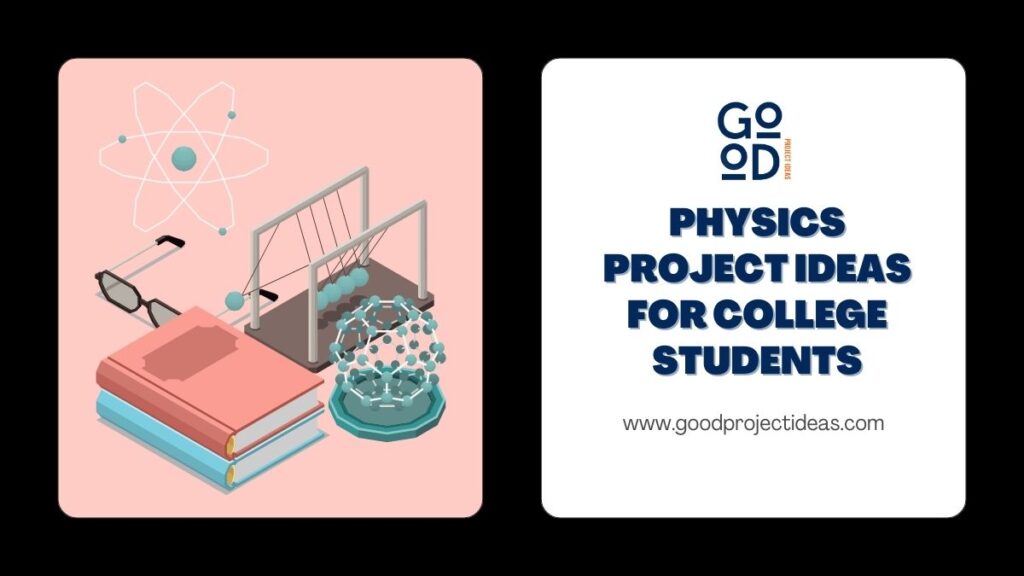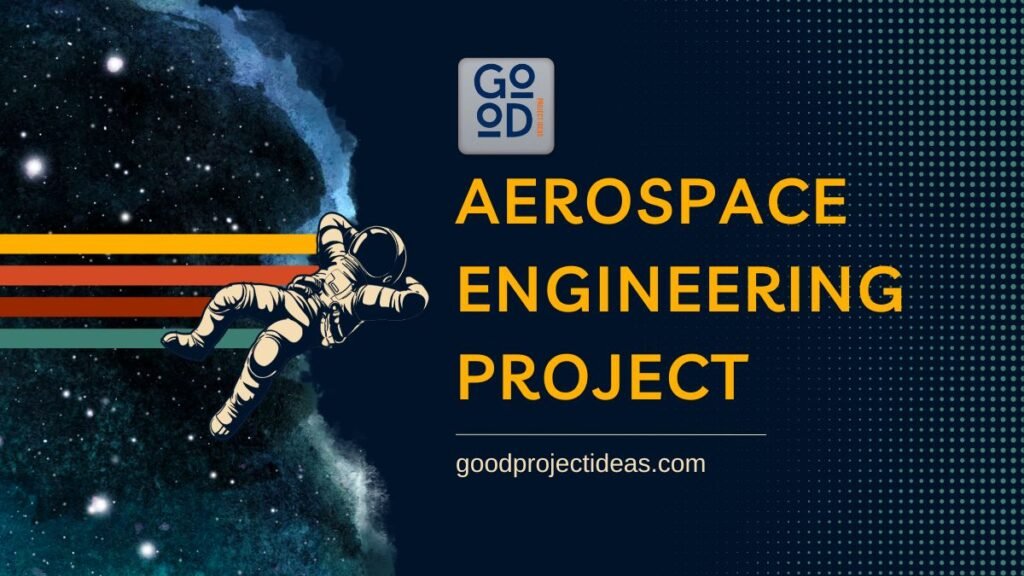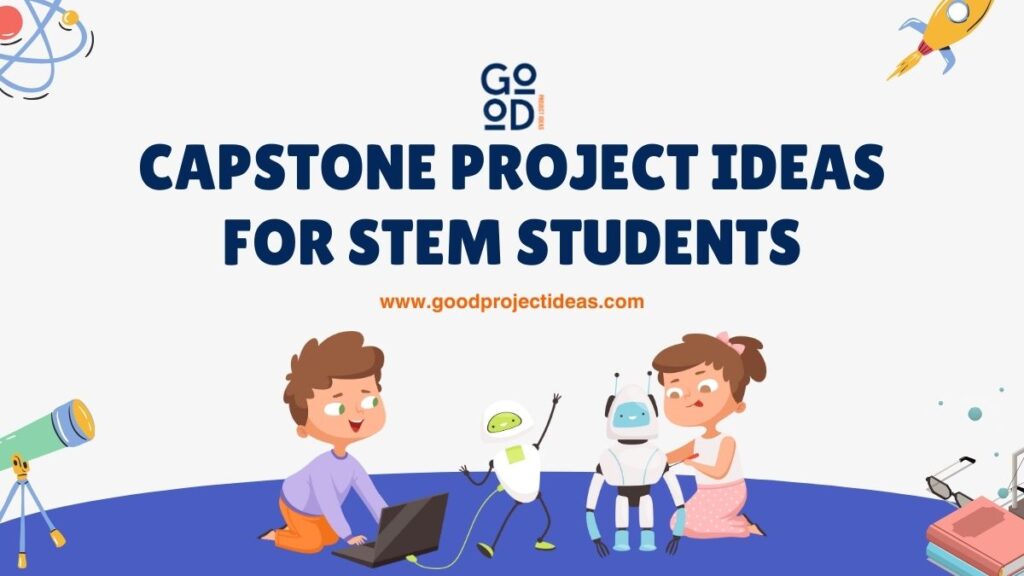Looking for cool physics project ideas for college students? Explore topics from mechanics to astrophysics, perfect for hands-on learning and fun experiments!
Physics is all about how things work, from tiny particles to space. College students who love exploring and experimenting find physics projects really fun and eye-opening.
Here, we’ll share exciting project ideas that make learning thrilling and memorable. Whether you’re into forces, light, or the weirder side of physics, these projects let your creativity shine!
The Importance of Physics Projects for College Students
Physics projects in college are crucial because they:
- Enhance Understanding: By applying concepts practically, they deepen your understanding.
- Develop Skills:
- Problem-Solving: Challenges improve critical thinking.
- Technical Proficiency: Using tools and software boosts technical know-how.
- Build Confidence: Successfully completing projects boosts self-assurance in physics.
- Improve Communication and Teamwork: Collaboration enhances these essential skills.
- Prepare for Future: Projects refine research skills and show real-world physics applications, valuable for future studies and careers.
In essence, physics projects offer more than grades. They enrich comprehension, hone skills, and prepare you for future endeavors.
Physics Project Ideas for College Students
Check out some of the best physics project ideas for college students:-
Mechanics and Motion
- Study of projectile motion
- Analysis of simple harmonic motion
- Experiment on Newton’s laws of motion
- Investigation of rotational motion
- Analysis of collisions using momentum
- Study of fluid dynamics
- Experiment on center of mass
- Analysis of torque and equilibrium
- Study of pendulum motion
- Experiment on conservation of mechanical energy
Thermodynamics and Heat Transfer
- Investigation of thermal expansion
- Experiment on specific heat capacity
- Study of heat conduction
- Analysis of heat transfer in different materials
- Experiment on laws of thermodynamics
- Investigation of thermal radiation
- Study of heat engines
- Experiment on refrigeration cycles
- Analysis of entropy in thermodynamic processes
- Study of phase transitions
Electricity and Magnetism
- Investigation of electric circuits
- Experiment on Ohm’s law
- Study of magnetic fields
- Analysis of electromagnetic induction
- Experiment on capacitors
- Investigation of inductors
- Study of RC circuits
- Experiment on transformers
- Analysis of electric and magnetic forces
- Study of electromagnetic waves
Optics and Light
- Investigation of reflection and refraction
- Experiment on lenses and mirrors
- Study of interference and diffraction
- Analysis of polarization
- Experiment on optical fibers
- Investigation of laser technology
- Study of spectroscopy
- Experiment on light absorption and emission
- Analysis of color perception
- Study of holography
Modern Physics
- Investigation of quantum mechanics
- Experiment on photoelectric effect
- Study of atomic structure
- Analysis of nuclear physics
- Experiment on particle physics
- Investigation of special relativity
- Study of blackbody radiation
- Experiment on wave-particle duality
- Analysis of quantum entanglement
- Study of cosmology
Acoustics and Sound
- Investigation of sound waves
- Experiment on resonance
- Study of musical acoustics
- Analysis of Doppler effect
- Experiment on sound absorption
- Investigation of ultrasound technology
- Study of acoustical engineering
- Experiment on sound synthesis
- Analysis of noise pollution
- Study of psychoacoustics
Astronomy and Astrophysics
- Investigation of celestial mechanics
- Experiment on stellar evolution
- Study of planetary science
- Analysis of cosmological models
- Experiment on observational astronomy
- Investigation of gravitational waves
- Study of dark matter and dark energy
- Experiment on exoplanet detection
- Analysis of space missions
- Study of astrobiology
Biophysics
- Investigation of biomechanics
- Experiment on biological membranes
- Study of molecular biophysics
- Analysis of protein folding
- Experiment on neurophysics
- Investigation of cell mechanics
- Study of biophysical chemistry
- Experiment on biopolymers
- Analysis of biophysical techniques
- Study of medical physics
Environmental Physics
- Investigation of climate change
- Experiment on atmospheric physics
- Study of oceanography
- Analysis of environmental pollution
- Experiment on renewable energy sources
- Investigation of geophysics
- Study of eco-physiology
- Experiment on biodiversity conservation
- Analysis of sustainable development
- Study of environmental impact assessment
Materials Science
- Investigation of crystallography
- Experiment on material properties
- Study of nanotechnology
- Analysis of semiconductor physics
- Experiment on magnetic materials
- Investigation of superconductivity
- Study of thin films
- Experiment on polymers
- Analysis of material processing techniques
- Study of biomaterials
Engineering Physics
- Investigation of engineering dynamics
- Experiment on mechanical vibrations
- Study of electrical machines
- Analysis of power systems
- Experiment on control systems
- Investigation of robotics
- Study of photonics
- Experiment on electronic devices
- Analysis of communication systems
- Study of computational physics
Interdisciplinary Projects
- Investigation of physics in sports
- Experiment on art conservation
- Study of physics in music
- Analysis of physics in medicine
- Experiment on physics in architecture
- Investigation of physics in forensics
- Study of physics in finance
- Experiment on physics in agriculture
- Analysis of physics in food science
- Study of physics in social sciences
Computational Physics
- Investigation of computational modeling
- Experiment on numerical simulations
- Study of data analysis in physics
- Analysis of computational quantum mechanics
- Experiment on molecular dynamics simulations
- Investigation of Monte Carlo methods
- Study of computational fluid dynamics
- Experiment on finite element analysis
- Analysis of computational astrophysics
- Study of machine learning in physics
Educational Physics
- Investigation of physics education research
- Experiment on innovative teaching methods
- Study of educational technology in physics
- Analysis of physics curriculum development
- Experiment on physics outreach programs
- Investigation of physics learning assessment
- Study of physics teacher training
- Experiment on physics educational games
- Analysis of physics laboratory design
- Study of physics in informal education
Historical Physics
- Investigation of history of physics
- Experiment on historical scientific instruments
- Study of biographies of physicists
- Analysis of historical physics discoveries
- Experiment on recreating historical experiments
- Investigation of history of physics education
- Study of physics in ancient civilizations
- Experiment on history of women in physics
- Analysis of physics in Renaissance art
- Study of philosophy of physics
These project ideas cover a wide range of topics in physics and can be tailored to suit the interests and expertise of college students.
Tips for a Successful Physics Project
Tips for a Successful College Physics Project:
- Choose a topic you’re interested in.
- Pick something you can manage with your resources and schedule.
- Set clear goals and plan your experiment.
- Stay safe and record your work carefully.
- Organize your data and analyze it simply.
- Write and present your findings clearly.
Follow these tips for a successful college physics project!
Which topic is best for physics project?
Here’s what to consider:
- Your Interests: Choose a topic that excites you, like mechanics, optics, electricity, or thermodynamics.
- Your Skill Level: Pick a project that matches what you already know but also challenges you.
- Project Requirements and Resources: Think about any rules from your teacher and what materials you have.
Here are some ways to find a project:
- Browse by Area of Physics: Look into mechanics, optics, electricity, magnetism, or modern physics.
- Think about Everyday Applications: Consider how physics relates to real-life things like building structures or designing simple machines.
- Ask Your Teacher: They might have suggestions or past projects you can use as inspiration.
Remember, the best project is one that interests you and lets you show your passion for physics!
How do you make a physics project?
Crafting a great physics project is like an exciting journey. Here’s a roadmap to help you along:
- Pick What You Love: Choose a physics topic that gets you curious and excited.
- Know Your Level: Find a project that’s challenging yet doable based on your skills.
- Explore Ideas: Look around for inspiration in different areas of physics or real-life applications.
- Plan Your Steps: Break your project into smaller tasks with deadlines to stay on track.
- Stay Safe: Always follow safety rules during experiments.
- Take Good Notes: Write down everything during experiments to help with analysis later.
- Get the Data Right: Collect accurate and precise data for meaningful results.
- Show Your Findings: Organize your data neatly and use visuals to explain your results.
- Write Clearly: Tell your project story in simple, clear language.
By following these steps, you’ll create a fantastic physics project that reflects your passion and hard work.
What is the easiest experiment to do on a physics project?
The “easiest” physics project can vary based on what materials you have and what interests you, but here are a few beginner-friendly ideas that require minimal equipment:
Exploring Motion
- Ramp Race: Make ramps with different inclines and time toy cars or marbles rolling down. See how the incline angle affects speed. (Explores gravity and acceleration)
- Paper Airplane Competition: Design paper airplanes with different wing shapes. Test which flies farthest or stays in the air longest. See how wing design affects flight. (Explores lift, drag, and aerodynamics)
Investigating Forces and Equilibrium
- Balancing Act: Try balancing various objects on a pencil or string. See which are easiest or hardest to balance and why. (Explores center of gravity and torque)
- Friction Tug-of-War: Secure a rope to a heavy object and pull it across various surfaces. Measure the force required to move it on each surface. (Explores the effects of friction)
Learning about Waves and Sound
- Pitch Perfect Straw: Blow across straws of different lengths and listen to the sound. See how length affects pitch. (Explores wave frequency and pitch)
- Cup Telephone: Connect two paper cups with a string. Speak into one cup and listen at the other. See how string length affects sound quality. (Explores sound waves)
Even these simple experiments can be enhanced with research and analysis. Look into the scientific principles behind each and think about how to improve the experiment for better results. Take photos or videos of your experiment and explain your findings clearly in your report. Include a conclusion summarizing your results and any ideas for future experiments.
By following these tips, you can turn a basic experiment into a meaningful physics project.
Conclusion
In short, these physics projects for college students are both fun and educational. They cover cool topics like motion, forces, waves, and sound, helping students understand how the world works.
By doing these experiments, students not only learn physics better but also get better at doing science stuff like experimenting, analyzing data, and talking about their findings. These projects are all about learning while having a blast, sparking curiosity, and making physics feel like an awesome adventure!
Meet Tom Latham from Good Project Ideas! He’s passionate about sparking creativity and making learning fun for all. Tom loves crafting engaging projects that inspire curiosity and hands-on exploration. Join him in bringing ideas to life!



